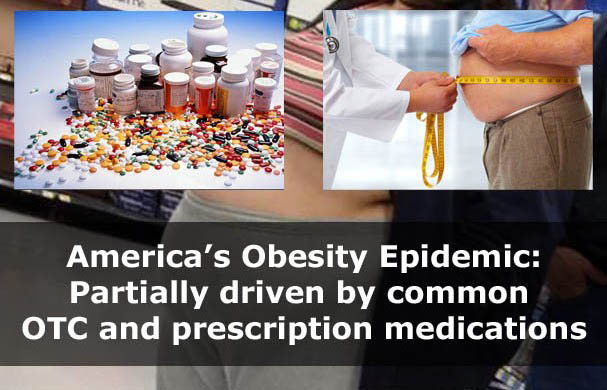Over 71% of Americans overweight, popular OTC and prescription drugs may play huge role

Health scientists are constantly looking at research data to determine why so many people are so huge. Lack of enough deep sleep, no adequate exercise, stress, and unhealthy food and drinks are well-known to be linked to overweight and obese populations. But the one widely underreported, underrated, and downplayed factor might be side effects from popular prescription and over the counter medications. Millions of unsuspecting patients may be experiencing something called drug-induced obesity. This article will discuss the current overweight and obesity statistics in the US as well as common medications that have been linked to obesity. Medical science literature has suggested healthcare professionals avoid using pharmaceutical agents that contribute to obesity, especially in already overweight-vulnerable patients. There are numerous questions patients should ask doctors as well as personal steps that can be taken to avoid the use of counterproductive medicine by becoming a more informed patient.
Underestimated Impacts of Obesity
Having such a large population of overweight and obese people means a country has a huge national security risk, enormous loss of capital and production (US costs estimated $147+ billion annually), and higher rates of depression. The impacts of being overweight can include loss of organ function, isolation, heart disease, heart attack, diabetes, and even early death.
As of 2014, the Centers for Disease Control and Prevention estimates at least 71% of US adults over 20 years of age are overweight. As of 2016, at least 40% of American adults over 20 years of age were considered obese, according to the American Medical Association. Obesity means a Body Mass Index of 30 or more, which is determined by calculating height in meters squared and then dividing it by weight in kilograms.
Table for BMI of Adults Ages 20 and Older
| BMI | Classification |
|---|---|
| 18.5 to 24.9 | Normal weight |
| 25 to 29.9 | Overweight |
| 30+ | Obese |
| 40+ | Extreme obesity |
You can calculate your BMI with the CDC’s BMI online calculator tool.
The Solution
In a perfect world, without lots of people on questionable prescription drug medications, without lots of digital distractions, we might say the solution for obesity is a simple matter of getting more exercise and reducing the intake of unhealthy foods and drinks. But this isn’t reality in 2018 America. The normal stresses of modern life, a poor economy, high amount of depression, and lots of technological distractions make finding solutions harder for most people. Losing weight is no longer a matter of just a diet change.
Not So Fast
The mental focus to remain on a diet and regularly exercise means a constant challenge exists for people that previously weren’t maintaining such a healthy lifestyle. It’s not just your focus, it’s pre-existing conditions. Going on a low calorie diet can be potentially dangerous for people with diabetes, liver disease, or other health problems. The internet is also full of junk science (untrue/unproven) claims about quick weight loss diets, supplements, and “broth formulas”. Some people are desperate and willing to spend money on fixes that don’t require personal effort or long-term commitments.
Scientifically-proven weight loss methods always involve well-known mechanisms — and time. It takes time to lose any significant weight. Although rigorous and reasonable exercise regimens can speed up short and long-term weight loss, healthy living is a matter of continuously eating and drinking the right things, mixed with regular exercise habits. To keep that weight off you’ll need to continue living a healthy life. Nothing else works.
Losing weight in 2018 means considering *every* possible contributing factor to your current weight situation. If you are overweight and on prescription drugs of any kind, you must think about the biological effect your prescriptions have on your body. You might be suffering from medication-induced obesity. Read on for more helpful health science tips to focus on improving your health status.
Medication & Side Effects
According to modern science, all medications have side effects. There are no exceptions. Unfortunately, not every person is willing to accept that fact — and not all doctors adequately address the side effect concerns of their patients.All drugs have side effects, but some of them don’t become apparent until after the drugs have been approved and in use for some time, according to Harvard Medical School.
Patients should also beware (read) of newer medications, which may have little to no long-term testing or undiscovered effects.
Some side effects are more lasting or serious than others. Practicing medicine involves weighing the benefits versus consequences of a medication or action (e.g., surgery). There is ample scientific evidence of inappropriate and overprescription drug trends occurring, but some drugs are a necessity for a select population, especially to maintain quality of life, to address insulin imbalances, and so forth. An informed patient has to consider how their prescription regimen may impact a diet or cause weight gain.
Many drugs cause complex interactions with your body’s metabolism, hormones, nutrient absorption, neurogenic status, and muscle function. Your strength, water retention, salt and sugar balances, and even mood can be impacted by prescription drugs.
Examples of drugs that can cause weight gain include:
Antidepressants & Antipsychotic Drugs
People with depression were 58% higher risk for becoming obese, according to a 2010 study. Antidepressants were strongly linked to weight gain. Examples of the drugs linked included amitriptyline (Elavil) and nortriptyline (Pamelor), paroxetine (Paxil), and phenelzine (Nardil). In fact, the mirtazapine (Remeron) antidepressant is so powerful at promoting weight gain that it is sometimes used to help underweight senior adults gain weight.1
Antihistamines
Popular antihistamines are also more likely to be linked to overweight people and higher insulin concentrations, such as Cetrizine (Zyrtect) and fexofenadine (Allegra). Histamine receptors are part of the brain’s appetite messaging center. Any interference or suppression of your histamine receptors can cause changes in your appetite (hunger).1
Beta-Blockers
Beta-blockers are prescribed for high blood pressure and heart attack prevention. Drugs, such as metoprolol (Lopressor) and atenolol (Tenormin), can cause low exercise motivation and weight gain. Beta-blockers can lower the metabolism and be counterproductive for obese patients.1 Some newer beta blockers, calcium channel blockers, and ACE inhibitors are considered weight-neutral alternatives (you might ask your doctor about them to assist with weight management).
Insulin drugs for diabetes1
Steroid drugs (e.g., prednisone)1
Hormone drugs (e.g., birth control pills)1
Drugs Caused Massive 150+ lbs. Weight Gain for 19-Year-Old
John Morton, MD is director of bariatric surgery at Stanford Hospital. He discusses the issue of patients gaining massive amounts of weight due to medications. One of his patients was a teenager that gained more than 150 pounds because of her lupus medication. Corticosteroids such as prednisone, antidepressants, Depakote, and heartburn drugs can also cause massive weight gain.
“Medication use is rampant in the U.S., with different medications at different stages of life causing weight gain, including: children and antibiotic use, teens and antidepressants and central nervous system stimulants, and adults with cholesterol-lowering medications, anti-rheumatism medications, anti-depressants, anti-bipolar and anti-psychotic medications, estrogen and insulin. Patients need to be made more aware of those drugs that can cause serious weight gain. And physicians should educate patients about the risks and offer available alternatives, especially in a case like Jena’s where diet and exercise recommendations to offset the effects were out of the question.” – John Morton, MD. Stanford Medicine.
Questions to Ask Your Doctor
Informed patients working with great doctors have the best outcomes. Being informed doesn’t mean reading random internet forums, trendy social media posts, drug advertisements, or being a hypochondriac. Being informed means studying the science, body of objective evidence, and being receptive to evidence-based medicinal information. Being informed also means being confident enough to ask your doctor questions and expecting open communication from your doctor.
Are my medications contributing to weight gain or difficulty losing weight?
Are my medications more harmful than beneficial?
Are there alternatives I can try that are safer than medications?
Is it safe to discontinue one or more of my prescriptions?
A good doctor will discuss the benefits and limitations for any of your prescriptions. If you ever hear your doctor say there are no side effects — for any drug, it’s time to find a more honest healthcare professional. Be ready to ask your doctor questions, which will help you make informed decisions.
Finally, just like you must think about the contributing factors to your current health situation, a professional with years of college training (e.g., your doctor) should be digging even deeper. The best healthcare comes from informed doctors and patients that work together.
How Your Doctor Can Help
Recent 2017 research published in the journal Gastroenterology suggests doctors should consider avoiding agents that contribute to weight gain. This means that your doctor needs to dig deeper into all of the drugs you’re taking and make sure that these are not promoting weight gain. Your doctor should also consider alternative treatments that may be more beneficial to your weight management, especially for obese patients. Alternative treatments might include another medication that doesn’t contribute to weight gain or other effective alternatives.
A good doctor will spend more than a few seconds discussing your medication regimens, current health status, your safe exercise regimen, and future health goals. It takes more time to perform a thorough assessment on a patient, especially for those with pre-existing health conditions. This must involve more careful consideration for how your medications are either helping or hurting your long-term health goals. Do not be afraid to seek second opinions or to seek help from a different doctor.
This article was provided for educational and information purposes and is not intended to be used for medical advice. Consult a physician about your condition(s) or medication(s). Do not start, discontinue or modify any prescription medication use without first consulting your doctor. By using our site, you agree to our Terms of Service.
Help Support Expert Science and Tech Articles
It takes hours, months, and years to research the articles we produce. We present unique science and tech from expert perspectives. Please help us by linking to our page, sharing it with friends, and liking our social media accounts (Facebook and @ULTRATechLife on Twitter) — coming soon in late summer 2018!
More about author.
